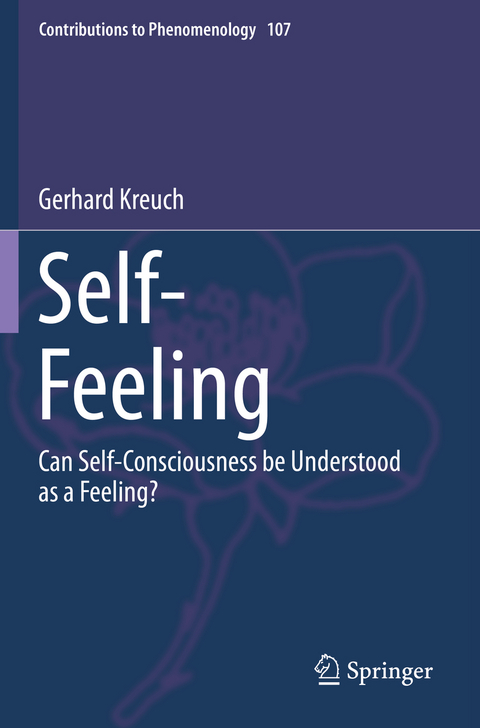
Self-Feeling
Springer International Publishing (Verlag)
978-3-030-30791-2 (ISBN)
This monograph offers new insights into the connection between self-consciousness and emotion. It focuses on what fundamental "feelings of being" tell us about ourselves. The results enrich the philosophy of human affectivity and help shed new light on some pressing, current problems.
The author seeks to understand self-consciousness as an affective phenomenon, namely as self-feeling. He identifies it as a pre-reflective, pre-propositional, bodily feeling that shapes our space of possibilities. It is the affective disclosure of individual existence. His account overcomes the difficulties of infinite regress and vicious circularity that reflective (or higher-order) accounts of self-consciousness struggle with. At the same time, it helps build a bridge between the basic level of self-consciousness and the higher level of more substantial thoughts about oneself. The title explores fundamental affectivity, Matthew Ratcliffe's theory of existential feelings, features of self-feeling, and appropriateness and inappropriateness in self-interpretation. It also considers the contributions of the Heidelberg School of self-consciousness to current debates.
The title provides students and researchers with a unique look into such vital philosophical questions as: What is self-consciousness? How do we know ourselves? It will also appeal to a wider audience interested in self-consciousness and/or human affectivity since it does not presuppose knowledge of the jargon.
lt;p>Gerhard Kreuch completed two graduate degrees in philosophy and socio-economics. During his PhD in philosophy he was Visiting Researcher at Stanford University. He was awarded the uni:docs fellowship for the best dissertation projects, the Marietta Blau Grant for studies abroad, and the prize for the best philosophical dissertation at the University of Vienna in 2017. His research focuses on questions of self-knowledge, self-consciousness, and philosophy of emotions.
Chapter 1. Introduction.- Part I. Self-Consciousness.- Chapter 2. A Brief Overview of Philosophy of Self-Consciousness.- Chapter 3. Challenges in Current Philosophy of Self-Consciousness - The Heidelberg School.- Chapter 4. The Affective Turn.- Part II. Affectivity.- Chapter 5. A Brief Overview of Philosophy of Human Affectivity.- Chapter 6. Matthew Ratcliffe's Theory of Existential Feelings.- Chapter 7. Stephan and Slaby´s Complementary Work.- Part III. Self-Feeling.- Chapter 8. The Features of Self-Feeling.- Chapter 9. How this Account of Self-Feeling Contributes to Today´s Debates.- Chapter 10. Self-Feeling and Unity.- Chapter 11. Appropriateness of Self-Feeling.- Part IV. Self-Feeling and Thought: Self-Interpretation.- Chapter 12. Self-Interpretation.- Chapter 13. Appropriateness and Inappropriateness in Self-Interpretation.- Chapter 14. Authenticity.
| Erscheinungsdatum | 04.12.2020 |
|---|---|
| Reihe/Serie | Contributions to Phenomenology |
| Zusatzinfo | XVII, 266 p. |
| Verlagsort | Cham |
| Sprache | englisch |
| Maße | 155 x 235 mm |
| Gewicht | 438 g |
| Themenwelt | Geisteswissenschaften ► Philosophie ► Philosophie der Neuzeit |
| Geisteswissenschaften ► Psychologie ► Klinische Psychologie | |
| Sozialwissenschaften | |
| Schlagworte | Features of self-feeling • Feelings of Being • Heidelberg School • Individual existence • knowing oneself • Phenomenology and subjectivity • Philosophy of human affectivity • Philosophy of self-consciousness • Pre-propositional Self-Knowledge • Pre-reflective self-consciousness • Self-feeling • Self-feeling and unity • Self-interpretation • Theory of existential feelings |
| ISBN-10 | 3-030-30791-3 / 3030307913 |
| ISBN-13 | 978-3-030-30791-2 / 9783030307912 |
| Zustand | Neuware |
| Haben Sie eine Frage zum Produkt? |
aus dem Bereich


